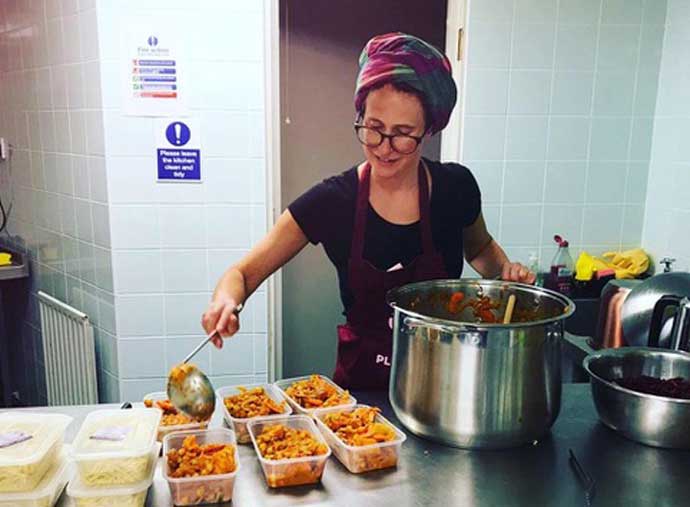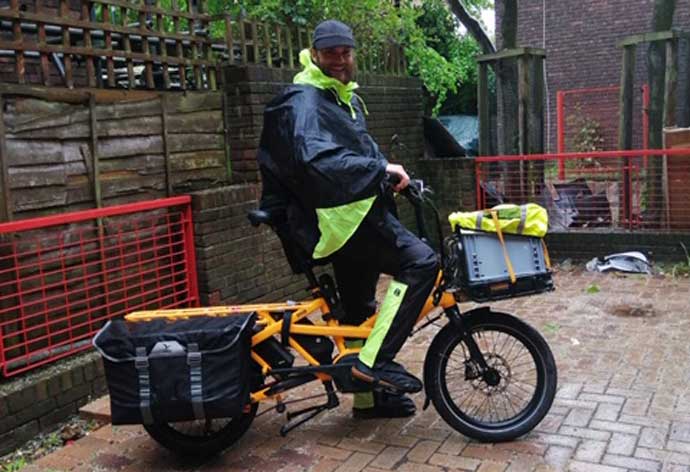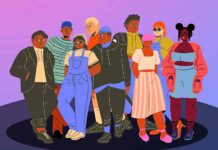
Transition Town Brixton’s Nick Anim and Susan Sheehan argue in “Our Common Future: From Scarcities to Shared Cities” that the coronavirus lockdown allows us to think about a different kind of economics that works for us all, rather than an economy we work for.
Like many community-based organisations and local government policymakers, Transition Town Brixton (TTB) have been thinking about the good things that have come out of the COVID-19 Lockdown, and how we can keep hold of them to help us ‘#buildbackbetter’.
With the government’s primary focus being on rebooting the economy, we would like to see a transition to an economy that works for us all, rather than an economy that we work for.
This would be an economy that helps us achieve carbon reduction targets of 7-8% a year, and an economy that values everyone’s contribution – surely one of the main takeaways from this crisis is that care workers are of greater value in the pursuit of our common future than bankers.
So, how can we build our common future together, better? How can we move from the status quo of scarcities to shared cities? We at Transition Town Brixton, together with other local groups, as well as our local authority Lambeth Council, have been discussing these questions around five main themes.
Transport
We have already seen space for cars being given over to bikes and pedestrians. Let’s keep this up and build on it to have more. We benefit from improved air quality and more space for nature, which leads to wellbeing, fewer road accidents and greater health. Moreover, for our common future, carbon emissions go down.
Food
Although supermarkets account for the majority of our food supply, they were not able to respond very quickly to the crisis. As a result, vegetable box schemes and other local food delivery projects have been in great demand. We have worked with the council to deliver over 7000 parcels to residents in need, using local supply chains.
If we are travelling shorter distances and by bike and on foot, we will need our local shops and suppliers more than ever. This will create more and better-paid jobs, and a local economy that people are loyal to, and which is better able to respond to unforeseen shocks and knocks.
Healthy locally-cooked food should also be part of the care we give people – what about a new community-led meals on wheels service – creating jobs but also provides continued opportunities for volunteers to connect with neighbours.

Consumption
Part of our environmental mission is to reduce consumption – to stop factories producing plastic and unwanted goods that consume finite resources and damage the natural environment.
Now that communities have linked up to support one another they are sharing more and consuming less. We’ve even had time to get into crafting and making our own ‘stuff’.
Why go back? This creativity is so good for us, so much more rewarding, promotes equity and shared cities.
Energy
 We are very dependent on big companies for energy to heat our buildings, but as we rebuild our economy we could be investing heavily in building localised community energy infrastructures that are less damaging to the environment.
We are very dependent on big companies for energy to heat our buildings, but as we rebuild our economy we could be investing heavily in building localised community energy infrastructures that are less damaging to the environment.
We could redirect the billions of pounds that are being invested in extracting hard to reach oil and gas into building wind, solar and other renewable energy infrastructure. We could be employing people at a local level to install solar panels, or set up anaerobic digesters, and network those energy supplies, further enhancing the ability of local communities to support one another.
Indeed we led pioneering community energy projects in Brixton and set up a community energy company – Repowering – which can help you design and develop your own community energy projects.
Fair pay/reduced inequality
The crisis has exposed the huge socio-economic inequalities in our country, and the burden that this places on our economy and the everyday life chances of many people. Those at the lower end of the income scale have needed more hospitalisation and costly NHS intervention, and they have been the first to need to apply for benefits as they lost their precarious jobs, with employers often preferring to completely lay off workers than furlough them.
Meanwhile those at the upper end of the income scale have been able to work from home or draw on saved money during the lockdown. How can we address such inequalities?
We want to see inequality reduced through wider use of the London Living wage, and higher rates of taxation for the wealthy. The economic impact of the pandemic is being compared to the war. After the war those at the very top end of the income scale, were taxed up to 98% (as compared to a maximum rate of 40% now) to fund the recovery and build a transformational welfare state. The post-war recovery strategy could be a model for building a low carbon economy.
As unwelcome and devastating as the COVID-19 pandemic has been and continues to be, we have all been forced to reflect on many aspects of our lives. For the sake of our common future, we must surely realise that there are better and more equitable ways to coexist, not just with each other, but also with the planet. The lockdown has triggered the imagination of many people, and inspired various community-based projects for a sharing economy and caring society. This tells us that the fear-filled mantra of predatory capitalism, ‘there is no alternative’, is defunct. There are many alternatives to help us #buildbackbetter.







A personal perspective.
Initially my response to this article was “This is a wonderful thesis and should be developed for the future”. This wonder quickly became muted by what I can only describe as ‘establishment conditioning’. At my age I’ve had years of this, characterised by thoughts that big business won’t allow such a state of affairs to burgeon; too threatening; reduction of power; fear that the potential upcoming depression will strip away anticipated profits; maybe even “What’s needed is a swift return to the status quo.” I.e. working people refilling the coffers. Cynically I see that it’s long been OK to let communities plug gaps which, morally, should be filled by the State. I saw the early days of voluntary and charitable bodies raising funds locally for resources to improve the lives of disabled citizens who were not being properly supported by the health system, because the health system was underfunded. Local “champions” were earmarked to kick off such initiatives. It has now become the norm to fund-raise on a large scale, relieving the State of responsibilities. Younger people than I have never known it any different.
Thinking this through further, however, the huge benefits of the halt to modern lifestyles (quickly becoming apparent) on the environment, community cohesion and changes in perspective related to caring for each other and the world we live in cannot be ignored. Children are learning that they are part of a larger whole, that their actions impact on others further removed from just family and that we are inter-dependent. It’s clear that communities are looking for answers to all the fundamental questions raised by “Transition Town Brixton” and Lambeth Council.. The ideas put forward here reflect projects that have been and are being undertaken in third world communities, harnessing natural resources and minimising waste. Small scale changes producing substantial benefits. Are there other UK communities also moving in this direction, or at least thinking this way? Undoubtedly. Well done Lambeth Council for working with local community organisations. If these are willing to enter into co-operatives to realise, as put forward, localised energy production for homes and small enterprises, food production (fresh fruit and veg) to sustain these meals on wheels and other local initiatives conceived and run by local people to support the neighbourhood, the weight of public support could be strong enough to make the thesis a reality. It IS wonderful and I hope it is supported long term and becomes the future.